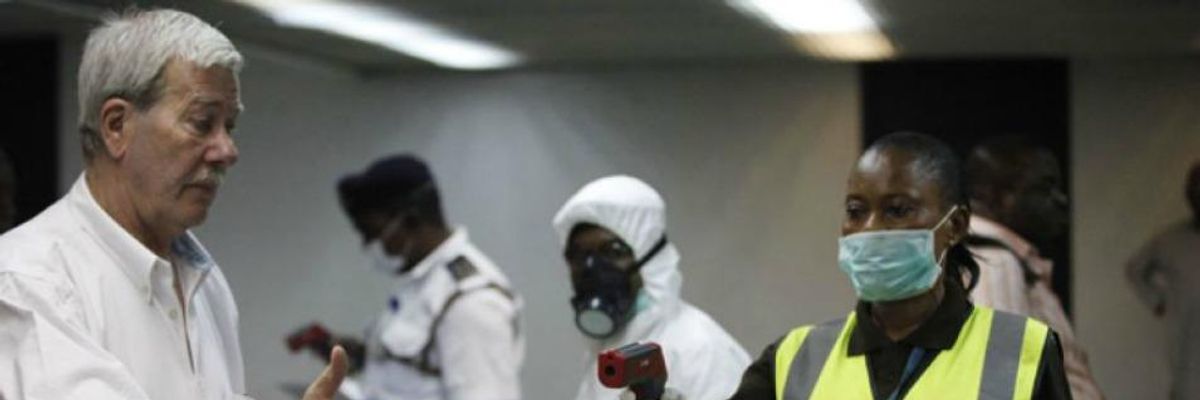Although American officials are making lots of reassuring noises about screening passengers coming from West Africa for signs of the dreaded Ebola virus, the truth is that the only way to totally safeguard against the spread of the disease is to close our borders entirely. And I don't see that happening anytime soon.
Talk about an unexpected side effect of globalization. Goods and services spread around the globe at the stroke of a keyboard or the roar of a jet engine, but the same mechanisms we celebrate as having pumped up the global economy also, potentially, have a darker side.
What was it Marx said about the bourgeoisie digging its own grave?
I keep hearing the undertone, in the media reporting on Ebola, of the "blame-the-victim" complaint, "What's wrong with these people? Why are they living in such poverty? Why don't they have doctors, nurses, hospitals? Look how their squalor is putting us all at risk?!"
There is truth to this. The poor folks in Liberia, Guinea and Sierre Leone, former colonies of the U.S., France and Great Britain, respectively, have not managed to modernize their societies. This is due to a number of factors, including corrupt leadership (strongmen often propped up by the Western powers), violent civil wars (armed by Western weapons manufacturers and distributors), and banana republic-style economies where Western corporations rule by extraction, extortion and exploitation, without giving anything back in taxes, infrastructure or education for the local people.
This is where the West has made its big mistake. How could we in the so-called developed world be so naive as to think that we could ignore the poverty and suffering of other parts of the globe without that poverty and suffering coming back to haunt us?
If we had invested in schools, medical facilities and housing in Liberia, instead of sending endless supplies of assault rifles and ammunition, we would not be worrying about Ebola now.
Likewise, if we had invested in education and economic development in the Middle East, instead of relying corrupt warlords to keep the population in line, we would not be dealing with a seemingly endless morphing insurgency of Taliban-Al Quaeda-Islamic State terrorists.
It really is true that an ounce of prevention is worth a pound of cure.
In a globalized society, pretending that vast disparities of wealth don't matter is just plain stupid. Imagining that a vicious virus can be contained by airport thermometer checks is as ridiculous as imagining that an international terrorist network can be stopped by a few fly-by bombings.
The world's leaders need to take a lesson from Malala Yousefzai, the 17-year-old girl who won the 2014 Nobel Peace Prize for her steadfast insistence, even after nearly having her head blown off by the Taliban, that girls should be educated.
Study after study has shown that when a society educates and empowers women, it becomes more economically successful and more politically stable.
This week, in my African Women Writing Resistance class, I've been reading and discussing the autobiography of Ellen Johnson Sirleaf, President of Liberia and first woman head of state in modern Africa.
Sirleaf, who won the Nobel Peace Prize in 2011, has been in the news a lot lately, begging for help in containing the spread of Ebola and warning grimly of the consequences of international inaction.
She came to office vowing to take her country back from the warlords and reintegrate child soldiers, to educate girls and boys and build a sustainable economy. She's made great strides, but the stark pictures of the pathetic state of the nation's health care infrastructure make it clear how far Liberia, like other poor African nations, still has to go.
The bottom line is this: if we want safety, we have to build towards it, step by step, from the ground up. We can't ignore poverty and then get mad when impoverished sick people dare to infect us, or when desperate people turn to radical Islam as a way out of their misery.
There is no excuse, in our globalized world, for the dramatic disparities of wealth and poverty that exist today. Those of us lucky enough to live comfortably in the U.S. or Europe should be using our privilege to advocate for those less fortunate.
Not just out of altruism. Out of self-preservation, too.
If we had been helping Liberia and other West African nations build good social infrastructure, instead of extracting profits from diamonds, rubber and gun sales, we would not be worrying about the spread of Ebola today.
If we had been educating children in Syria, Yemen and Iraq instead of supporting corrupt dictators and ignoring the plight of ordinary people, we would not be facing the spread of Islamic extremism today.
How many innocent humans will have to die before we begin to understand that simple adage? An ounce of prevention is worth a pound of cure.
